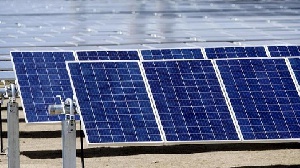A renewable energy expert at the Centre for Scientific and Industrial Research (CSIR), Dr. Francis Boateng Agyenim, has called on government to implement the feed-in tariff regime set out in the Renewable Energy Act 2011 that encourages companies to use solar energy to reduce the burden on the national grid.
Under a feed-in tariff regime, eligible renewable electricity generators including homeowners, business owners, farmers and private investors are paid a cost-based price for the renewable electricity they supply to the grid.
“The Renewable Energy Law makes room for what we call feed-in tariff that has not been implemented in Ghana. So, if this is implemented it has a consequence on the cost and also the upkeep of solar,” Dr. Boateng Agyenim said during a stakeholders’ meeting on solar energy in Accra.
“The government can’t do much; we have relied too much on government, they can’t do much. The only thing that government can do is to create an enabling environment in terms of the feed-in tariff’s implementation and making sure that there is much education for understanding the solar concept,” he said.
It is estimated that for a country using under 2,000 megawatts of electricity currently, Ghana ought to be bringing on-stream 200 megawatts of new capacity every year. This additional capacity requires US$200million of annual investment.
Commenting on what can be done to promote use of solar power, Postino Dugle-Business Development Manager of Tino Solutions, said government must waive tariffs on solar batteries in order to make the cost of installation cheaper so it can be affordable to many.
“We are looking at the ECOWAS levy and the other minor taxes that they charge at the port. What is still a major concern in the industry is the tax placed on batteries for solar storage.
“It takes nearly 50 percent of the cost, from the experience that we have at the port; we are paying close to 20 percent duty. In addition to other components, we pay something close to 35 percent on taxes – and this is the heart of the solar system.
“It is important that we get assistance from government; it should take a second look, so that if the 30 percent tax on batteries is taken out, you can imagine the impact it will have on the solar business,” he said.
Business News of Tuesday, 5 June 2018
Source: thebftonline.com













